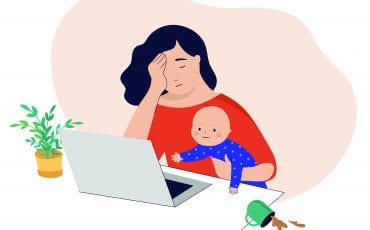Mommy Burnout: Helpful Ideas to Help You Cope

Atlanta Parent spoke to Monica DiCristina, a licensed professional counselor in Atlanta, about how moms can handle burnout during this time.

Monica DiCristina
As a therapist, what issues are you seeing in parents?
Parents, who already struggle with time to care for themselves and meet their own needs, are struggling even more with that. I am also seeing the weight of decision fatigue. Decisions as a parent already feel big, because you are trying to make the best path forward for the people you love the most in the world. Now, you are trying to balance different opinions and boundaries about the pandemic, the ripple effects of potential exposure to loved ones and not knowing how long you will be making each decision for.
What are your tips for dealing with anxiety or decision fatigue?
We often function like machines, rather than human beings. We are not wired to, nor capable of, giving out constantly. Exhaustion is cumulative, and so is burnout. Consider medication if that’s needed. Wholeheartedly accept your limitations. As parents, we live and breathe as if we can control everything because we want the best for our kids, but we are limited as humans. There’s a peace that comes with embracing your limitations: the ramifications of what other people decide are out of my hands, so I need to decide what feels comfortable to me and let the rest go. With decision fatigue, why is it so hard for you to say no? Instead of getting critical, get curious. Are you afraid of not pleasing someone, rejection, being judged by what people will think?
As a parent, when can you be honest with your kids about what you’re feeling?
It is really positive for your kids to see you model vulnerability and taking care of yourself. For example: “I am feeling really stressed today, which is normal when things are hard. So, I am going to do what I know really helps me and go for a run.” We don’t ever want to lean on our kids for emotional support. Being honest and human with your kids is one thing, but relying on them for emotional support is not part of parenting.
“Staying positive” is advice that’s often given during difficult times. Are there actionable ways to stay positive with yourself and your family?
I don’t think kids need a positive mom. The pressure for moms to be “positive” can have a negative impact on their mental health and confidence as a parent. I would encourage moms to focus more on connecting with and being present to their kids. Paying attention to your kids, listening to them, staying curious about what they are telling you, being involved in their everyday lives – these are much more impactful than positivity.
How can moms handle the extra responsibilities this pandemic has created?
Moms tend to carry the “mental load” for the family – meaning they are thinking of everything and what is next, even when not executing on it. This mental load can be exhausting. Let your partner in on the mental load from the teacher emails to the volunteer requests, and delegate decisions to your partner to help.
A lot of moms have the tendency to over-function, leaving the people in their life with the easy load of under-functioning. Reevaluate where you might be over-functioning in your roles. Set realistic expectations for yourself. This could look like saying no more, serving frozen pizza for dinner more, delegating more and not volunteering yourself for things.
What’s your advice for single parents?
Single parents are the heroes of the parenting world, and even more so now. Remember your context. Comparing what you are alone to a two-parent or two-caregiver household is just unfair and not helpful. Ask for support. As humans, and women especially, we feel pressured to present as though we are needless, and this is not true for any of us. Ask for the help that you need from a colleague or boss for more flexibility in your schedule. Ask a friend to give you time to recharge your batteries for a couple of hours. Evaluate and reevaluate your boundaries as needed.
What’s your advice for couples? (Disclaimer: This advice is not relevant in an abusive marriage.)
The context of what you are living through will put a strain on relationships. Relationships need to have extra support added when there is more weight put on it. We make the relationship strong through increased connection time, which doesn’t have to be an elaborate date night or weekend away. Connection is actually built on small moments. Prioritize these small moments to remember who you are as individuals and as a couple. Building in small moments of daily connection – coffee in the morning before the kids are up, a walk around the block holding hands while the kids ride ahead on their bikes, takeout dinner date after the kids are in bed – can be small wins for maintaining this connection during a stressful time.
After a fight, separate to get emotionally regulated. Create a calm space together, where you can talk about the different buttons that got pushed for each of you during the fight and to connect to yourself and your spouse in a vulnerable way.
Throw out the traditional division of labor you had as a couple. Give each other a break on what you need a break from, which can create compassion and break up the monotony of your daily routines.
What is your advice for essential workers, who are having to deal with the added stress of being out and about?
Don’t forget your context. You are on the frontlines of a global trauma, which has ramifications for compassion fatigue and mental, physical and emotional exhaustion. We’re all relying on essential workers, and they’re likely not getting the support they deserve or need. Reach out wherever you can get any support: from a family member or spouse, find discounted therapy or therapy funds, find therapists with flexible hours. Prioritize your self-care.
What are your tips for dealing with the guilt of juggling childcare and working from home?
Throw the guilt out the window. The last thing a working mother needs during this pandemic is a false sense of guilt for not being able to fulfill an unrealistic version of herself. The myth of balancing it all is just that—a myth. What works more realistically is prioritization. Work and staying employed is an essential priority, but after that, any of the extras need to be addressed and removed. Write a short list of what things take priority in your life, and therefore your time, and measure each extra request by that list.
Since this pandemic has been hard on everyone, do you have any tips for getting over your guilt about reaching out to other people and “bothering” them with your own issues when you need support?
When we show other people our vulnerability, we give them permission to do the same. When we allow ourselves to be honest with our support network, not only will we get the support we need, but we will send the message that it is ok for others to do the same. Reframe it from “bothering” other people to giving them and yourself the permission to be human and be there for each other. Allow yourself to receive the same love you would give to others.
How can you handle the guilt when you’re feeling tired of your family?
We have to be honest with ourselves without shame, which makes us better at loving others. Love does not mean you’re never annoyed. You can be annoyed and still be wholly devoted. The more permission we give ourselves to be human, the less shame we feel. When you’re feeling tired of your family, you have nothing to feel guilty about; you just need time alone. You need time away from people to recharge and time away from your kids to miss your kids.
8 Ways Moms Can Refresh:
It can be hard to remember that you’re a person, not just a list of responsibilities. Start incorporating time for yourself by making these small changes.
- “Prioritize recharging moments for yourself, like 10 minutes of meditation, a short walk around the block, listening to your favorite songs or calling a close friend,” DiCristina says.
- Make sleep a priority. Create a bedtime routine, and as much as possible, stick to it.
- Get active. Take a walk, watch a yoga or exercise video, have a dance party with your kids. Try to get some movement in every day.
- Clean up your social media. Unfollow negative friends or accounts that make you feel worse. Try to limit your time online.
- Do mindfulness exercises, either alone or as a family. To help you start, download an app, like Smiling Mind, that offers daily meditation programs.
- “Pause on daily tasks for a few minutes to do absolutely nothing!” Battle says. “Put the baby in a safe and secure place, close the door to your office, indulge in your favorite snack, or even take a few quiet minutes in the bathroom to take some deep breaths. Take some time throughout the day to decompress.”
- Make a list of things you’re proud of to give yourself credit for all the amazing things you do.
- Help the family become less reliant on you. Have the kids fix their own lunch one day a week.




